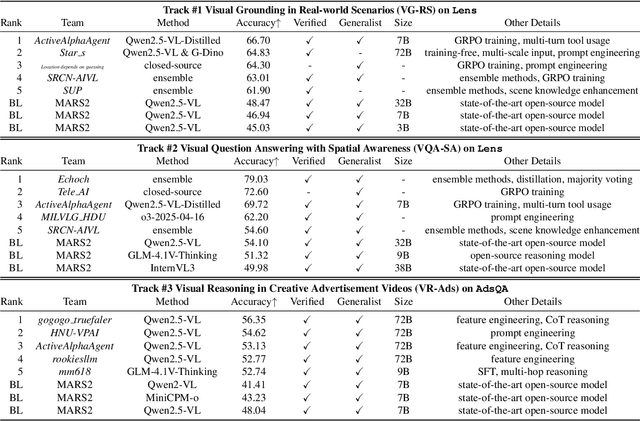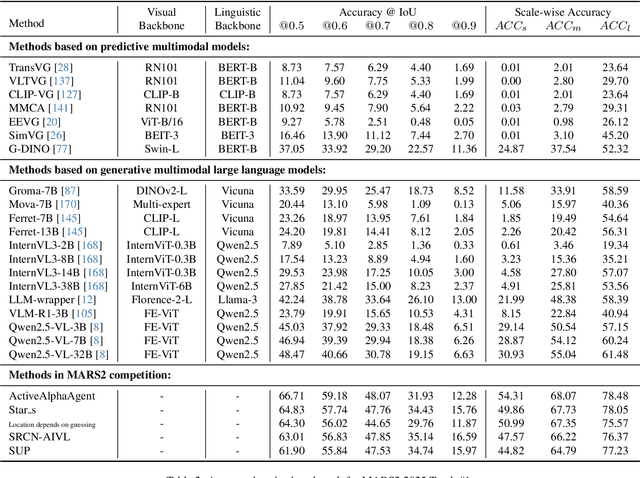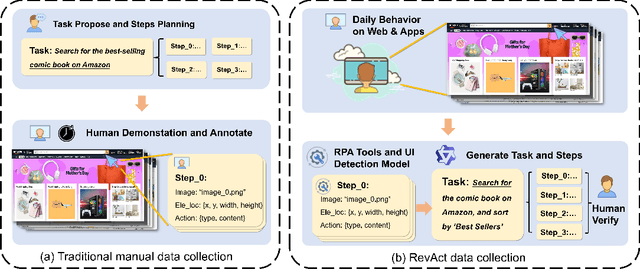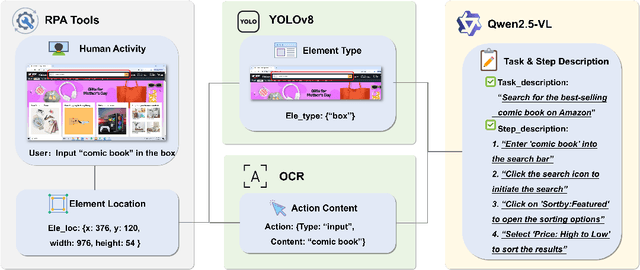Zhilong Song
MARS2 2025 Challenge on Multimodal Reasoning: Datasets, Methods, Results, Discussion, and Outlook
Sep 17, 2025



Abstract:This paper reviews the MARS2 2025 Challenge on Multimodal Reasoning. We aim to bring together different approaches in multimodal machine learning and LLMs via a large benchmark. We hope it better allows researchers to follow the state-of-the-art in this very dynamic area. Meanwhile, a growing number of testbeds have boosted the evolution of general-purpose large language models. Thus, this year's MARS2 focuses on real-world and specialized scenarios to broaden the multimodal reasoning applications of MLLMs. Our organizing team released two tailored datasets Lens and AdsQA as test sets, which support general reasoning in 12 daily scenarios and domain-specific reasoning in advertisement videos, respectively. We evaluated 40+ baselines that include both generalist MLLMs and task-specific models, and opened up three competition tracks, i.e., Visual Grounding in Real-world Scenarios (VG-RS), Visual Question Answering with Spatial Awareness (VQA-SA), and Visual Reasoning in Creative Advertisement Videos (VR-Ads). Finally, 76 teams from the renowned academic and industrial institutions have registered and 40+ valid submissions (out of 1200+) have been included in our ranking lists. Our datasets, code sets (40+ baselines and 15+ participants' methods), and rankings are publicly available on the MARS2 workshop website and our GitHub organization page https://github.com/mars2workshop/, where our updates and announcements of upcoming events will be continuously provided.
GUI-Robust: A Comprehensive Dataset for Testing GUI Agent Robustness in Real-World Anomalies
Jun 17, 2025



Abstract:The development of high-quality datasets is crucial for benchmarking and advancing research in Graphical User Interface (GUI) agents. Despite their importance, existing datasets are often constructed under idealized conditions, overlooking the diverse anomalies frequently encountered in real-world deployments. To address this limitation, we introduce GUI-Robust, a novel dataset designed for comprehensive GUI agent evaluation, explicitly incorporating seven common types of anomalies observed in everyday GUI interactions. Furthermore, we propose a semi-automated dataset construction paradigm that collects user action sequences from natural interactions via RPA tools and then generate corresponding step and task descriptions for these actions with the assistance of MLLMs. This paradigm significantly reduces annotation time cost by a factor of over 19 times. Finally, we assess state-of-the-art GUI agents using the GUI-Robust dataset, revealing their substantial performance degradation in abnormal scenarios. We anticipate that our work will highlight the importance of robustness in GUI agents and inspires more future research in this direction. The dataset and code are available at https://github.com/chessbean1/GUI-Robust..
 Add to Chrome
Add to Chrome Add to Firefox
Add to Firefox Add to Edge
Add to Edge